While UMD students comprised the majority of the audience, UMD faculty and staff along with students and faculty from other area colleges attended, as well.
The event was hosted by LSBE’s Economics and Accounting and Finance Departments with Dr. Ariuna Taivan, assistant professor of Economics and Dr. Jason Turkiela, assistant professor of Finance, spearheading the initiative.
“I think the more we can expose out students to public and private figures, policy makers, and industry leaders, the more we will bring to them the subject area to life,” said Taivan. “It was very informative and useful talk. Our students were able to hear from the actual person who is in charge of monetary policy and connect what they have learned in class with actual implications.”
"As I tell my students, members of the Federal Open Market Committee (FOMC), like President Kashkari, are arguably the most influential group of people on the planet," said Turkiela. "By establishing the direction of monetary policy in the United States, the FOMC has the ability to affect the performance of the world's largest economy, as well as set the tone for the monetary policy positions of other major central banks.”
Kashkari represents the Ninth Federal Reserve District, which is made up of Minnesota, Montana, North and South Dakota, 26 counties in northwestern Wisconsin, and the Upper Peninsula of Michigan.
The Federal Reserve “manages the ups and downs of the economy,” Kashkari said and is independent of the government. “We were assigned two goals from Congress,” he explained, “ensure a stable economy and maximize employment.”
“Our job is to represent you,” Kashkari added. “We go to Washington eight times a year to work on issues and determine policy.”
Following his introduction, audience members peppered Kashkari with approximately 30 questions in the lively Q&A session, and Kashkari responded not only with answers but also with questions of his own as well.
Topics covered included the labor shortage, education and student debt, cryptocurrency, and house buying, among others.
Labor shortage
He asked the first question of the evening to the audience on what they thought their job prospects were. He followed that with the fact that despite the views that there is a shortage of jobs, there are jobs out there.
During his travels throughout his district, he said that across the board, employers are lamenting about a shortage of labor. “I ask them if they’ve raised wages,” said Kashkari. “When they say no, I tell them, ‘You’re just whining.’ When you raise wages and still have a problem, I’ll know you’re serious.”
Kashkari also noted that businesses need to train their employees, “They tell me they don’t have skilled labor. I tell them, ‘why don’t you train them?’ Businesses need to wake up to that if they want growth.”
He expressed that the United States’ labor market is growing, but it’s growing very slowly. He offered three options to deal with this dilemma.
- Boost immigration
- Embrace slow growth
- Or subsidize fertility – like Japan is doing.
“People laugh when I say that option, but there could be subsidies, tax credits, and such to encourage people to have more children.”
Education/Student debt
Education is only becoming more important, Kashkari stressed. “We have to show the world how educated our workforce is.” He added that while the student debt problem is huge, he’s not sure how to fix it, offering that one solution may be to look at new delivery methods.
Cryptocurrency
Several questions revolved around cryptocurrency, which is like bitcoin, which Kashkari said point blankly “So far, I’m disappointed in its evolution. It has become a farce.”
There are approximately 1,500 types of cryptocurrency in existence, he said, “and I kid you not, there’s even banana coin. Right now it seems like it’s a fad, like beany babies and fidget spinners.”
The boom in cryptocurrency stems from the fact it’s not regulated, he explained. Whereas, United States federal currency is protected from counterfeiting, cryptocurrency is not.
Buying a house
In response to a question about how graduates should approach purchasing a future house, Kashkari expressed that there is no point in worrying about the real estate market. Rather, worry about having the upfront money for items such as down payment, title search, survey, escrow, and inspection, he advised. Then ensure that you’re going to be in that house, “that market” he said, for five to 10 years. That way you’re building equity in your house. If you are moving every two to three years, overall upfront costs will hurt you economically, he warned.
Other items of discussion included the U.S. import quota on steel and aluminum and the Chinese retaliation of import quota on 128 U.S. products. Kashkari also talked about the role of community banks, their decline due to high competition from large regional banks, cost and technology, urbanization, regulation and other factors.
"As a senior LSBE student, I appreciated the rare opportunity to learn from Neel Kashkari's remarkable career,” said Courtney Basara, who is a marketing major. “I was very impressed with his presentation skills and the fact he was so welcoming and approachable to students was incredible." (Basara and Kashkari also connected on LinkedIn and again by phone later to discuss future opportunities for Basara.)
At the conclusion of the event, Kashkari invited students forward to have their photos taken with him.
Visit the Labovitz School of Business and Economics website.
